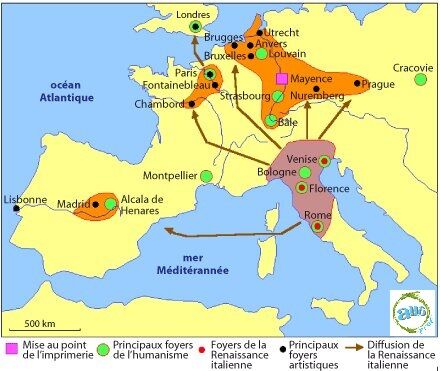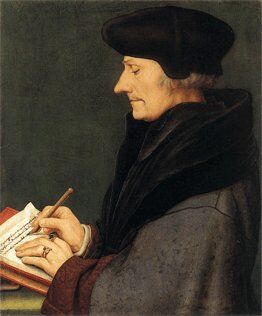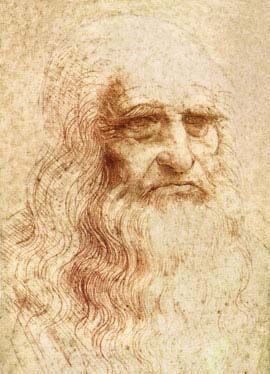The concepts covered in this factsheet go beyond those seen in secondary school. It is intended as a supplement for those who are curious to learn more.
Humanism is a European cultural movement that developed during the Renaissance. It changed the way people thought about themselves and their relationship with the world. This new way of thinking brought with it a number of other ideas that considerably modified artistic and social aspects. The notions of freedom, tolerance, independence, openness and curiosity are associated with this cultural movement.
Very early on in Italy, from the end of the 13th century onwards, texts from Antiquity served as models of wisdom and training for mankind. This movement towards ancient texts and knowledge was, however, radically increased by the arrival of large numbers of Greek refugees fleeing the Turks. They had in their possession the manuscripts and traditions of the Greeks and Romans of Antiquity. This whole movement was amplified a little later by the capture of Constantinople.

Map showing the main centres of humanism
This burgeoning interest in Antiquity, combined with the rediscovery of a number of forgotten texts and traditions, led to changes in the way the world, knowledge and people in general were perceived: people wanted to reconnect with the knowledge and way of life of a prestigious era.
From the beginning of the Renaissance, scholars developed a new perception of the Middle Ages: this period was now associated with ignorance. The humanists were driven by the desire to rediscover the true texts, as they had been written, and thus rediscover the authenticity of the ideas of Antiquity. This desire was even expressed by the Pope, who strongly encouraged research into textual and religious traditions. He even commissioned a translation of the Kabbalah, a sacramental Jewish text.
To disseminate this new knowledge, several new translations of Antiquity texts were made, and many copyists worked to produce new copies. These texts were also taught in schools. The new ideal of knowledge spread thanks to new technologies, including printing. This spread was greatly helped by the new development of large cities, the creation of universities and the development of administrative and judicial institutions. Education changed, and the way in which the training of young people was conceived and the subjects taught changed to promote the ability to speak, think and live.
The new ideas generated by Italian scholars and artists first spread to Germany and Holland. In these regions, a number of major cities encouraged the emergence and spread of new ideas; they were regions rich in cultural exchange. It was also the first area to see the spread of printing, making it even easier to communicate ideas. The world's first trilingual college was built here.

Erasmus
Erasmus became the beacon of the new culture. This intellectual traveller represented the new values of humanism. He passed them on throughout Europe thanks to his correspondence with scholars from all over the world.
Humanism arrived in France in the 14th century. At that time, a number of Italian humanists were living in Avignon. They introduced their philosophy and the texts of Antiquity. The arrival of several translators encouraged the discovery and teaching of Antiquity's philosophy. Later, Francis I brought professors and artists to France to help found another trilingual college where Latin, Greek and Hebrew were taught.
Several regions of Europe were also to feel the effects of this new wave: Poland, Hungary, Spain and finally England. It was also in Spain that the very first Bible written in several languages was published.
This movement was largely inspired by Latin conceptions of Man. The very word humanism comes directly from the Latin word humanitas. This word was used to express the idea that Man distinguishes himself and is characterised by his culture and gentleness. With this concept also comes that of humanores litteral, which represents human letters, i.e. all written discourse on philosophy, poetry, science and all other disciplines of research.
With humanism, humanity is associated with the idea of culture, which is the essence of Man. This perception is in stark contrast to the model of virility and warrior strength that was promoted in the Middle Ages. Indeed, medieval models focused on sanctity or military heroism. Moreover, in the humanists' vision, it was not specialisation in a specific field that was valued, but diversity of talent and knowledge of all fields. However, the fields of study are more developed and the research methods are more systematic.

Leonardo da Vinci
According to this vision of diversified talents and interests, Leonardo da Vinci represents the humanist par excellence, since he was interested in the arts, sciences, the human body and technologies.
Contrary to what was emphasised in medieval times, it is no longer God who is at the centre of everything, it is Man. With this vision of humanity, man is capable of thinking for himself and is not subject to fate. They have a free will that allows them to make choices, but without challenging the power of God.
According to humanist philosophy, humanity is endowed with an intelligence that enables it to learn more and more, but it also has the power to improve itself. Humanists wanted to make knowledge available to humanity, which is why they wrote, travelled and corresponded so much.
Humanism is characterised by confidence. This confidence is linked above all to human progress and knowledge. Indeed, according to scholars, only knowledge can develop a human being and enable him or her to move forward. That's why the Renaissance was a time when societies emphasised progress, new scientific discoveries, new inventions, research and so on. This emphasis stemmed above all from a sense of confidence: people were convinced that humanity could improve the world.
To continue this development of thought and knowledge, it was also necessary to have confidence in civilisation, as a medium for knowledge, and curiosity, as the driving force behind this research. This confidence cuts across all fields: religion, philosophy, the arts, literature and science.
Since the individuals who are valued in society are now scholars who master several languages, knowledge becomes the main driving force in society. Happiness is based on study and knowledge. This knowledge has to be passed on through education, which becomes highly valued. This was reflected in the opening of numerous colleges and universities during the Renaissance. The relationship with education changed: students had to learn to think, to study texts from Antiquity and to know several languages.
It was at this time that certain philosophers began to question the way religion was practised. They did not question the existence of God or religion in itself. What they were questioning was the way in which religion should be lived, as proposed by the Church. This questioning eventually led to the religious Reformation.
The education system underwent a complete transformation during the Renaissance, the effects of which were felt well into the 18th century. The great erudition of students changed the way culture was viewed. From then on, culture would be Latinised and full of quotations. Several editions of the classics continued to appear. And interest in texts from Antiquity was not to decline any time soon.
However, the cultural world did undergo a degree of change compared to what was emphasised during the humanism period. This change can be seen above all in the names given to texts. Whereas the humanities were used to refer to all texts, there was now a split between two specific fields: the sciences and literature.
The optimistic vision of humanity conveyed by humanism was modified slightly during the 17th century. It was during this period, in particular through the writings of Pascal, that the vision came a little closer to religion. Pascal saw man's condition as irredeemably sinful, in stark contrast to the free will of the 16th century.
In the 18th century, during the Enlightenment, philosophy made a return to humanism. Although there were many differences, the philosophy of Enlightenment revived confidence in human progress. We can therefore conclude that humanism is a school of thought that is firmly rooted in its time. It did influence a number of later philosophers, but ideas were constantly evolving. Humanism cannot be dissociated from the historical context from which it emerged.